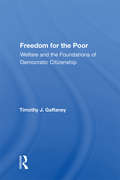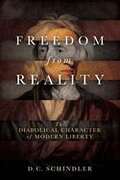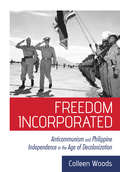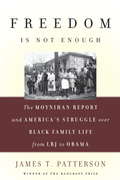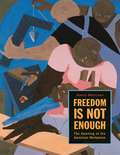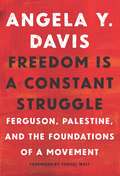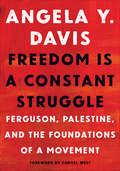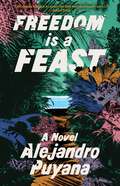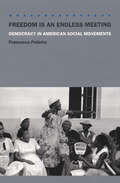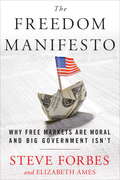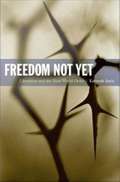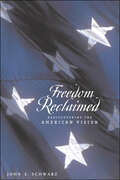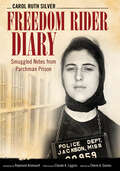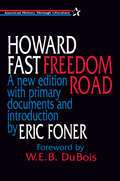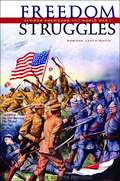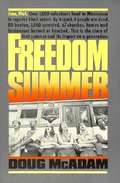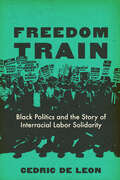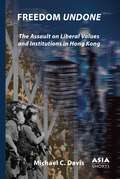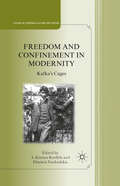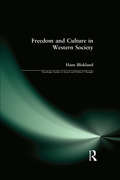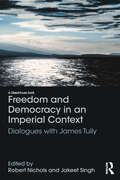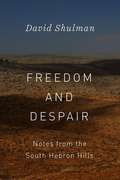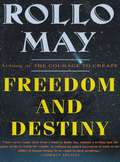- Table View
- List View
Freedom For The Poor: Welfare And The Foundations Of Democratic Citizenship
by Timothy J. GaffaneyA compelling examination of the meanings of citizenship and their relationship with the question of public welfare provision in the United States today. Public debates on the question of public assistance in the United States reflect long-standing disputes within liberal democratic theory on the meanings of liberty, equality, and citizenship. In Fr
Freedom From Reality: The Diabolical Character of Modern Liberty (Catholic Ideas for a Secular World Series)
by D. C. SchindlerIt is commonly observed that behind many of the political and cultural issues that we face today there are impoverished conceptions of freedom, which, according to D. C. Schindler, we have inherited from the classical liberal tradition without a sufficient awareness of its implications. <p><p>Freedom from Reality presents a critique of the deceptive and ultimately self-subverting character of the modern notion of freedom, retrieving an alternative view through a new interpretation of the ancient tradition. While many have critiqued the inadequacy of identifying freedom with arbitrary choice, this book seeks to penetrate to the metaphysical roots of the modern conception by going back, through an etymological study, to the original sense of freedom.
Freedom Incorporated: Anticommunism and Philippine Independence in the Age of Decolonization (The United States in the World)
by Colleen WoodsFreedom Incorporated demonstrates how anticommunist political projects were critical to the United States' expanding imperial power in the age of decolonization, and how anticommunism was essential to the growing global economy of imperial violence in the Cold War era.In this broad historical account, Colleen Woods demonstrates how, in the mid-twentieth century Philippines, US policymakers and Filipino elites promoted the islands as a model colony. In the wake of World War II, as the decolonization movement strengthened, those same political actors pivoted and, after Philippine independence in 1946, lauded the archipelago as a successful postcolonial democracy. Officials at Malacañang Palace and the White House touted the 1946 signing of the liberating Treaty of Manila as a testament to the US commitment to the liberation of colonized people and celebrated it under the moniker of Philippine–American Friendship Day. Despite elite propaganda, from the early 1930s to late 1950s, radical movements in the Philippines highlighted US hegemony over the new Republic of the Philippines and, in so doing, threatened American efforts to separate the US from sordid histories of empire, imperialism, and the colonial racial order.Woods finds that in order to justify US intervention in an ostensibly independent Philippine nation, anticommunist Filipinos and their American allies transformed local political struggles in the Philippines into sites of resistance against global communist revolution. By linking political struggles over local resources, like the Hukbalahap Rebellion in central Luzon, to a war against communism, American and Filipino anticommunists legitimized the use of violence as a means to capture and contain alternative forms of political, economic, and social organization. Placing the post-World War II history of anticommunism in the Philippines within a larger imperial framework, in Freedom Incorporated Woods illustrates how American and Filipino intelligence agents, military officials, paramilitaries, state bureaucrats, academics, and entrepreneurs mobilized anticommunist politics to contain challenges to elite rule in the Philippines.
Freedom Is Not Enough: The Moynihan Report and America's Struggle over Black Family Life -- from LBJ to Obama
by James PattersonOn June 4, 1965, President Lyndon Johnson delivered what he and many others considered the greatest civil rights speech of his career. Proudly, Johnson hailed the new freedoms granted to African Americans due to the newly passed Civil Rights Act and Voting Rights Act, but noted that "freedom is not enough. ” The next stage of the movement would be to secure racial equality "as a fact and a result. ” The speech was drafted by an assistant secretary of labor by the name of Daniel Patrick Moynihan, who had just a few months earlier drafted a scorching report on the deterioration of the urban black family in America. When that report was leaked to the press a month after Johnson’s speech, it created a whirlwind of controversy from which Johnson’s civil rights initiatives would never recover. But Moynihan’s arguments proved startlingly prescient, and established the terms of a debate about welfare policy that have endured for forty-five years. The history of one of the great missed opportunities in American history, Freedom Is Not Enough will be essential reading for anyone seeking to understand our nation’s ongoing failure to address the tragedy of the black underclass.
Freedom Is Not Enough: The Opening of the American Workplace
by Nancy MacLeanIn the 1950s, the exclusion of women and of black and Latino men from higher-paying jobs was so universal as to seem normal to most Americans. Today, diversity in the workforce is a point of pride. How did such a transformation come about? In this bold and groundbreaking work, Nancy MacLean shows how African-American and later Mexican-American civil rights activists and feminists concluded that freedom alone would not suffice: access to jobs at all levels is a requisite of full citizenship. Tracing the struggle to open the American workplace to all, MacLean chronicles the cultural and political advances that have irrevocably changed our nation over the past fifty years. Freedom Is Not Enough reveals the fundamental role jobs play in the struggle for equality. We meet the grassroots activists—rank-and-file workers, community leaders, trade unionists, advocates, lawyers—and their allies in government who fight for fair treatment, as we also witness the conservative forces that assembled to resist their demands. Weaving a powerful and memorable narrative, MacLean demonstrates the life-altering impact of the Civil Rights Act and the movement for economic advancement that it fostered. The struggle for jobs reached far beyond the workplace to transform American culture. MacLean enables us to understand why so many came to see good jobs for all as the measure of full citizenship in a vital democracy. Opening up the workplace, she shows, opened minds and hearts to the genuine inclusion of all Americans for the first time in our nation’s history.
Freedom Is a Constant Struggle: Ferguson, Palestine, and the Foundations of a Movement
by Angela Y. Davis Frank BaratIn these newly collected essays, interviews, and speeches, world-renowned activist and scholar Angela Y. Davis illuminates the connections between struggles against state violence and oppression throughout history and around the world. Reflecting on the importance of black feminism, intersectionality, and prison abolitionism for today's struggles, Davis discusses the legacies of previous liberation struggles, from the Black Freedom Movement to the South African anti-Apartheid movement. She highlights connections and analyzes today's struggles against state terror, from Ferguson to Palestine. Facing a world of outrageous injustice, Davis challenges us to imagine and build the movement for human liberation. And in doing so, she reminds us that "Freedom is a constant struggle. "
Freedom Is a Constant Struggle: Ferguson, Palestine, and the Foundations of a Movement
by Angela Y. DavisIn this collection of essays, interviews, and speeches, the renowned activist examines today&’s issues—from Black Lives Matter to prison abolition and more. Activist and scholar Angela Y. Davis has been a tireless fighter against oppression for decades. Now, the iconic author of Women, Race, and Class offers her latest insights into the struggles against state violence and oppression throughout history and around the world. Reflecting on the importance of black feminism, intersectionality, and prison abolitionism, Davis discusses the legacies of previous liberation struggles, from the Black Freedom Movement to the South African anti-Apartheid movement. She highlights connections and analyzes today&’s struggles against state terror, from Ferguson to Palestine. Facing a world of outrageous injustice, Davis challenges us to imagine and build a movement for human liberation. And in doing so, she reminds us that &“freedom is a constant struggle.&” This edition of Freedom Is a Constant Struggle includes a foreword by Dr. Cornel West and an introduction by Frank Barat.
Freedom Is a Feast
by Alejandro PuyanaA multigenerational, Latin American saga of love and revolution in which a rebel who commits a youthful betrayal receives a late-life chance at redemption and a new life: &“a tour de force&” from &“the new master&” (Luis Alberto Urrea, New York Times bestselling author of Good Night, Irene). In 1964, Stanislavo, a zealous young man devoted to his ideals, turns his back on his privilege to join the leftist movement in the jungles of Venezuela. There, as he trains, he meets Emiliana, a nurse and fellow revolutionary. Though their intense connection seems to be love at first sight, their romance is upended by a decision with consequences that will echo down through the generations. Almost forty years later, in a poor barrio of Caracas, María, a single mother, ekes out a precarious existence as a housekeeper, pouring her love into Eloy, her young son. Her devotion will not be enough, however, to keep them from disaster. On the eve of the attempted coup against President Chávez, Eloy is wounded by a stray bullet, fracturing her world. Amid the chaos at the hospital, María encounters Stanislavo, now a newspaper editor. Even as the country itself is convulsed by waves of unrest, this twist of fate forces a belated reckoning for Stanislavo, who may yet earn a chance to atone for old missteps before it&’s too late. With its epic scope, gripping narrative, and unflinching intimacy, Freedom Is a Feast announces a major new talent. Alejandro Puyana has delivered a wise and moving debut about sticking to one&’s beliefs at the expense of pain and chaos, about the way others can suffer for our misdeeds even when we have the best of intentions, and about the possibility for redemption when love persists across time. Winner of the Westport Prize for Literature
Freedom Is an Endless Meeting: Democracy in American Social Movements
by Francesca PollettaThis &“excellent study of activist politics in the United States over the past century&” challenges the conventional wisdom about participatory democracy (Times Literary Supplement). Freedom Is an Endless Meeting offers vivid portraits of American experiments in participatory democracy throughout the twentieth century. Drawing on meticulous research and more than one hundred interviews with activists, Francesca Polletta upends the notion that participatory democracy is worthy in purpose but unworkable in practice. Instead, she shows that social movements have often used bottom-up decision making as a powerful tool for political change. Polletta traces the history of democracy from early labor struggles and pre-World War II pacifism, through the civil rights, new left, and women&’s liberation movements of the sixties and seventies, and into today&’s faith-based organizing and anti-corporate globalization campaigns. In the process, she uncovers neglected sources of democratic inspiration—such as Depression-era labor educators and Mississippi voting registration workers—as well as practical strategies of social protest. Polletta also highlights the obstacles that arise when activists model their democracies after nonpolitical relationships such as friendship, tutelage, and religious fellowship. She concludes with a call to forge new kinds of democratic relationships that balance trust with accountability, respect with openness to disagreement, and caring with inclusiveness. For anyone concerned about the prospects for democracy in America, Freedom Is an Endless Meeting will offer abundant historical, theoretical, and practical insights.
Freedom Manifesto: Why Free Markets Are Moral and Big Government Isn't
by Steve Forbes Elizabeth AmesFrom Steve Forbes, the iconic editor in chief of Forbes Media, and Elizabeth Ames coauthors of How Capitalism Will Save Us--comes a new way of thinking about the role of government and the morality of free markets. Americans today are at a turning point. Are we a country founded on the values of freedom and limited government, as envisioned by the founding fathers in the Declaration of Independence and the Constitution? Or do we want to become a European-style socialist democracy? What best serves the public good--freedom or Big Government? In Freedom Manifesto, Forbes and Ames offer a new twist on this historic debate. Today's bloated and bureaucratic government, they argue, is anything but a force for compassion. Instead of assuring fairness, it promotes favoritism. Instead of furthering opportunity, it stifles economic growth. Instead of unleashing innovation and material abundance, its regulations and price controls create rigidity and scarcity. Not only are Big Government's inefficient and ever-expanding bureaucracies ill-equipped to deliver on their promises--they are often guilty of the very greed, excess, and corruption routinely ascribed to the private sector. The only way to a truly fair and moral society, the authors say, is through economic freedom--free people and free markets. Throughout history, open markets have helped the poor and everyone else by unleashing unprecedented creativity, generating wealth, and raising living standards. Promoting trust, generosity, and democracy, economic freedom has been a more powerful force for individual rights, self-determination--and humanity--than any government bureaucracy. Freedom Manifesto captures the spirit of a new movement that is questioning old ideas about the morality of government and markets for the first time since the Great Depression. Going beyond the familiar explanations and sound bites, the authors provide a fully developed framework of "first principles" for a true understanding of the real moral and ethical distinctions between more and less government. This timely and provocative book shows why free markets and liberty are the only way to a better future and a fair and humane society.
Freedom Not Yet: Liberation and the Next World Order
by Kenneth SurinThe neoliberal project in the West has created an increasingly polarized and impoverished world, to the point that the vast majority of its citizens require liberation from their present socioeconomic circumstances. The marxist theorist Kenneth Surin contends that innovation and change at the level of the political must occur in order to achieve this liberation, and for this endeavor marxist theory and philosophy are indispensable. In Freedom Not Yet, Surin analyzes the nature of our current global economic system, particularly with regard to the plight of less developed countries, and he discusses the possibilities of creating new political subjects necessary to establish and sustain a liberated world. Surin begins by examining the current regime of accumulation--the global domination of financial markets over traditional industrial economies--which is used as an instrument for the subordination and dependency of poorer nations. He then moves to the constitution of subjectivity, or the way humans are produced as social beings, which he casts as the key arena in which struggles against dispossession occur. Surin critically engages with the major philosophical positions that have been posed as models of liberation, including Derrida's notion of reciprocity between a subject and its other, a reinvigorated militancy in political reorientation based on the thinking of Badiou and Zizek, the nomad politics of Deleuze and Guattari, and the politics of the multitude suggested by Hardt and Negri. Finally, Surin specifies the material conditions needed for liberation from the economic, political, and social failures of our current system. Seeking to illuminate a route to a better life for the world's poorer populations, Surin investigates the philosophical possibilities for a marxist or neo-marxist concept of liberation from capitalist exploitation and the regimes of power that support it.
Freedom Reclaimed: Rediscovering the American Vision
by John E. SchwarzHas the nation's infatuation with the free market warped the true meaning of American freedom by its emphasis on the self-serving individual in a "looking out for Number One" world?Freedom is America's most treasured value. In Freedom Reclaimed, John E. Schwarz examines the profound implications of the difference between the vision of American freedom that the Founders enshrined in the Declaration of Independence and the free-market idea of freedom that is ascendant today. Schwarz shows how the three-decade shift toward free-market freedom has brought economic hardship to the majority of Americans and suffering to the political life of the nation. As the nation moves further away from its impelling original commitment, most Americans now have only limited access to the freedom the Founders envisioned. Schwarz sets forth a program that can help America return to its ennobling vision and resume its historic journey.In policy discussions on employment, education, social issues, and health care, Schwarz recasts our understanding of what freedom means and involves. In so doing, he transforms the way we see our world and revitalizes our ability to change it for the better.
Freedom Reclaimed: Rediscovering the American Vision
by John E. SchwarzA political scientist examines how the meaning of freedom has changed in American discourse—and how we can reclaim our most treasured value.The vision of American freedom that the Founders enshrined in the Declaration of Independence is very different from the free-market idea of freedom that is ascendant today. In Freedom Reclaimed, John E. Schwarz examines the profound implications of this shift in political rhetoric. Schwarz shows how the three-decade shift toward free-market freedom has brought economic hardship to the majority of Americans and suffering to the political life of the nation. As the nation moves further away from its impelling original commitment, most Americans now have only limited access to the freedom the Founders envisioned.In policy discussions on employment, education, social issues, and health care, Schwarz recasts our understanding of what freedom means and involves. He then sets forth a program that can help America return to its ennobling vision and resume its historic journey.
Freedom Rider Diary: Smuggled Notes from Parchman Prison (Willie Morris Books in Memoir and Biography)
by Carol Ruth SilverArrested as a Freedom Rider in June of 1961, Carol Ruth Silver, a twenty-two-year-old recent college graduate originally from Massachusetts, spent the next forty days in Mississippi jail cells, including the Maximum-Security Unit at the infamous Parchman Prison Farm. She chronicled the events and her experiences on hidden scraps of paper which amazingly she was able to smuggle out. These raw written scraps she fashioned into a manuscript, which has waited, unread for more than fifty years. Freedom Rider Diary is that account. Freedom Riders were civil rights activists who rode interstate buses into the segregated southern United States in 1961 to test the US Supreme Court rulings outlawing segregation in interstate bus and terminal facilities. Brutality and arrests inflicted on the Riders called national attention to the disregard for federal law and the local violence used to enforce segregation. Police arrested Riders for trespassing, unlawful assembly, and violating state and local Jim Crow laws, along with other alleged offenses, but they often allowed white mobs to attack the Riders without arrest or intervention. This book offers a heretofore unavailable detailed diary from a woman Freedom Rider along with an introduction by historian Raymond Arsenault, author of the definitive history of the Freedom Rides. In a personal essay detailing her life before and after the Freedom Rides, Silver explores what led her to join the movement and explains how, galvanized by her actions and those of her compatriots in 1961, she spent her life and career fighting for civil rights. Framing essays and personal and historical photographs make the diary an ideal book for the general public, scholars, and students of the movement that changed America.
Freedom Rising
by Christian WelzelThis book presents a comprehensive theory of why human freedom gave way to increasing oppression since the invention of states - and why this trend began to reverse itself more recently, leading to a rapid expansion of universal freedoms and democracy. Drawing on a massive body of evidence, the author tests various explanations of the rise of freedom, providing convincing support of a well-reasoned theory of emancipation. The study demonstrates multiple trends toward human empowerment, which converge to give people control over their lives. Most important among these trends is the spread of 'emancipative values', which emphasize free choice and equal opportunities. The author identifies the desire for emancipation as the origin of the human empowerment trend and shows when and why this desire grows strong; why it is the source of democracy; and how it vitalizes civil society, feeds humanitarian norms, enhances happiness, and helps redirect modern civilization toward sustainable development.
Freedom Road: A New Edition With Primary Documents And Introduction By Eric Foner
by Howard Fast Eric Foner W. E. DuBois"Howard Fast makes superb use of his material. ... Aside from its social and historical implications, Freedom Road is a high-geared story, told with that peculiar dramatic intensity of which Fast is a master". -- Chicago Daily News
Freedom Struggles: African Americans and World War I
by Adriane Lentz-Smith<p>For many of the 200,000 black soldiers sent to Europe with the American Expeditionary Forces in World War I, encounters with French civilians and colonial African troops led them to imagine a world beyond Jim Crow. They returned home to join activists working to make that world real. In narrating the efforts of African American soldiers and activists to gain full citizenship rights as recompense for military service, Adriane Lentz-Smith illuminates how World War I mobilized a generation. <p>Black and white soldiers clashed as much with one another as they did with external enemies. Race wars within the military and riots across the United States demonstrated the lengths to which white Americans would go to protect a carefully constructed caste system. Inspired by Woodrow Wilson’s rhetoric of self-determination but battered by the harsh realities of segregation, African Americans fought their own “war for democracy,” from the rebellions of black draftees in French and American ports to the mutiny of Army Regulars in Houston, and from the lonely stances of stubborn individuals to organized national campaigns. African Americans abroad and at home reworked notions of nation and belonging, empire and diaspora, manhood and citizenship. By war’s end, they ceased trying to earn equal rights and resolved to demand them. <p>This beautifully written book reclaims World War I as a critical moment in the freedom struggle and places African Americans at the crossroads of social, military, and international history.</p>
Freedom Summer
by Doug McadamThe event in question is the 1964 Mississippi Freedom Summer campaign, or, as it was simply known at the time, the Summer Project. Spearheaded by the Student Non-Violent Coordinating Committee (SNCC), the project lasted less than three months, from early June until late August. During that time, better than 1,000 people, the vast majority of them white Northern college students, journeyed South to work in one of the forty-four local projects that comprised the overall campaign. While in Mississippi, the volunteers lived in communal "Freedom Houses" or were housed by local black families who refused to be intimidated by segregationist threats of violence. Their days were taken up with a variety of tasks, principally registering black voters and teaching in so-called Freedom Schools.
Freedom Train: Black Politics and the Story of Interracial Labor Solidarity
by Cedric De LeonRevealing the central role of Black activists in spurring interracial solidarity in the US labor movement. Most accounts of interracial solidarity focus on white union activists. In Freedom Train, Cedric de Leon, a former organizer and elected leader in the US labor movement, argues that we can't comprehend the history of workers' triumphs in the United States without investigating the role of Black liberation. This book shows that, from the early twentieth century to the years immediately following the March on Washington and beyond, independent Black labor organizations have pushed the white labor movement toward a fierce and effective interracial solidarity. Drawing on the minutes, correspondence, and speeches of Black labor activists and organizations from 1917 to 1968, de Leon reveals that Black people have been the most ardent and consistent proponents of racial inclusion, leadership representation, and programs linking economic and racial justice. He also demonstrates how conflict and consensus among Black labor groups fueled the fight for solidarity, as different factions split and consolidated to form successive and sometimes competing Black labor organizations. Freedom Train centers the contributions of Black people to the multiracial unions we have today and demonstrates that internal conflict can be a source of strategic innovation and social movement success.
Freedom Undone: The Assault on Liberal Values and Institutions in Hong Kong (Asia Shorts)
by Michael C. DavisWhat happens when liberal constitutional institutions are undone? Can Freedom survive the loss of separation of powers with the associated legal and political accountability? The Chinese Communist Party has been at the forefront in its disdain for liberal institutions and promoting illiberal alternatives. This disdain placed Hong Kong people on the frontlines of the global struggle for freedom. Since its handover from Britain, Hong Kong has felt the brunt of China’s illiberal agenda, recently with increased intensity since the crackdown in 2019 and Beijing’s imposition of a National Security Law in 2020. Thousands have been jailed and a city famous for vigorous protests has been silenced. Professor Michael Davis, a close observer who taught human rights and development in the city for three decades, takes us on the constitutional journey of both the city’s vigorous defense of freedom and its repressive undoing—a painful loss for Hong Kong and a lesson for the world.
Freedom and Confinement in Modernity
by Dimitris Vardoulakis A. Kiarina KordelaKafka's literary universe is organized around constellations of imprisonment. Freedom and Confinement in Modernity proposes that imprisonment does not signify a tortured state of the individual in modernity. Rather, it provides a new reading of imprisonment suggesting it allows Kafka to perform a critique of a modernity instead.
Freedom and Culture in Western Society (Routledge Studies in Social and Political Thought #5)
by Hans BloklandCritically examining conceptions of freedom of some of the leading contemporary philosophers from Isaiah Berlin to Charles Taylor, Hans Blokland explores the value and significance that freedom has acquired on our political consciousness. He looks specifically at: * positive and negative freedom * freedom of the individual * freedom and society * emancipation and paternalism * freedom and cultural politics.
Freedom and Democracy in an Imperial Context: Dialogues with James Tully
by Robert Nichols Jakeet SinghFreedom and Democracy in an Imperial Context: Dialogues with James Tully gathers leading thinkers from across the humanities and social sciences in a celebration of, and critical engagement with, the recent work of Canadian political philosopher James Tully. Over the past thirty years, James Tully has made key contributions to some of the most pressing questions of our time, including: interventions in the history of moral and political thought, contemporary political philosophy, democracy, citizenship, imperialism, recognition and cultural diversity. In 2008, he published Public Philosophy in a New Key, a two-volume work that promises to be one of the most influential and important statements of legal and political thought in recent history. This work, along with numerous other books and articles, is foundational to a distinctive school of political thought, influencing thinkers in fields as diverse as Anthropology, History, Indigenous Studies, Law, Philosophy and Political Science. Critically engaging with James Tully’s thought, the essays in this volume take up what is his central, and ever more pressing, question: how to enact democratic practices of freedom within and against historically sedimented and actually existing relationships of imperialism?
Freedom and Despair: Notes from the South Hebron Hills
by David ShulmanLately, it seems as if we wake up to a new atrocity each day. Every morning is now a ritual of scrolling through our Twitter feeds or scanning our newspapers for the latest updates on fresh horrors around the globe. Despite the countless protests we attend, the phone calls we make, or the streets we march, it sometimes feels like no matter how hard we fight, the relentless crush of injustice will never abate. David Shulman knows intimately what it takes to live your beliefs, to return, day after day, to the struggle, despite knowing you are often more likely to lose than win. Interweaving powerful stories and deep meditations, Freedom and Despair offers vivid firsthand reports from the occupied West Bank in Palestine as seen through the eyes of an experienced Israeli peace activist who has seen the Israeli occupation close up as it impacts on the lives of all Palestinian civilians. Alongside a handful of beautifully written and often shocking tales from the field, Shulman meditates deeply on how to understand the evils around him, what it means to persevere as an activist decade after decade, and what it truly means to be free. The violent realities of the occupation are on full display. We get to know and understand the Palestinian shepherds and farmers and Israeli volunteers who face this situation head-on with nonviolent resistance. Shulman does not hold back on acknowledging the daily struggles that often leave him and his fellow activists full of despair. Inspired by these committed individuals who are not prepared to be silent or passive, Shulman suggests a model for ordinary people everywhere. Anyone prepared to take a risk and fight their oppressive political systems, he argues, can make a difference—if they strive to act with compassion and to keep hope alive. This is the moving story of a man who continues to fight for good in the midst of despair. An indispensable book in our era of reactionary politics and refugee crises, political violence and ecological devastation, Freedom and Despair is a gripping memoir of struggle, activism, and hope for peace.
Freedom and Destiny
by Rollo May"May is an existential analyst who deservedly enjoys a reputation among both general and critical readers as an accessible and insightful social and psychological theorist. ... Freedom's characteristics, fruits, and problems; destiny's reality; death; and therapy's place in the confrontation between freedom and destiny are examined. ... Poets, social critics, artists, and other thinkers are invoked appropriately to support May's theory of freedom and destiny's interdependence."-Library Journal. "Especially instructive, even stunning, is Dr. May's willingness to respect mystery. ... There is, too, at work throughout the book a disciplined yet relaxed clinical mind, inclined to celebrate ... what Flannery O'Connor called 'mystery and manners,' and to do so in a tactful, meditative manner. "-Robert Coles, America.
